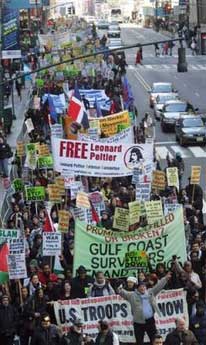Worldwide protests condemn U.S. occupation of Iraq
By
John Catalinotto
Published Mar 18, 2006 11:10 PM
Hundreds of thousands of people worldwide
demonstrated on March 18-20 to mark the third anniversary of the U.S.-led
invasion of Iraq and three years of occupation of that once-sovereign
country.
The protests began first in Sydney, Australia, Tokyo, Japan and
Manila in the Philippines. They then spread like a wave across the globe:
Indonesia, Thailand, Viet nam, Malaysia, Pakistan, Turkey, South Africa, Greece,
Cyprus and Hun gary, Spain and Portugal, Brazil, Vene zuela, Nicaragua, Cuba,
Mexico, the United States and Canada.
Some of the largest actions were
national protests in the capitals of countries with large contingents of troops
supporting the U.S.-led occupation of Iraq: 50,000 in Rome, Italy, and a similar
number in London, England. Good-sized demonstrations also took place in Warsaw,
Poland, and in Seoul, Korea on March 19. There were groups in at least 40
countries in all that reported their protests on the Internet or were covered in
the media by March 21. There may well have been more in the Arab world and
Africa that will be reported later.
There is a temptation to compare the
anniversary protest with those of Feb. 15, 2003, when over 10 million people
came out on the streets worldwide in a desperate attempt to stop Washington from
launching its war of aggression. But it is a false comparison because three
years ago masses of people wanting to avoid war came out in the belief that
their action would be heard in the White House. The Bush administration pushed
on with the war as it is now doing with the occupation.
Now the people who
demonstrated know that they are involved in a protracted struggle with a
powerful enemy—U.S. imperialism and its allies in Western Europe and
Japan. Many people, even from these imperialist centers, are in open solidarity
with the armed Iraqi resistance. This was shown by the successful speaking tour
of Abdeljabbar al-Kubaysi, a spokesperson for one of the resistance groups, who
toured Portugal and Spain before addressing the crowd at Piazza Navona in Rome
on March 18.
Tacit support for the resistance was also demonstrated by the
calls for immediate and unconditional withdrawal of the occupation troops. Other
demands warned against imperialist intervention against Iran, North Korea, Cuba
and Venezuela.
The call to organize protests first came last fall from
anti-war coalitions in Britain and the United States. Support for the actions on
the anniversary of the invasion of Iraq won international support at the
European Social Forum in Vienna, the World Social Forum meetings in Bamako,
Mali, and Caracas, Venezuela, and at regional meetings in Asia.
The
international call was clearly for immediate withdrawal and expressed
appreciation for the heroic efforts of the Iraqis to drive out the occupiers.
This was seconded by 55 communist parties, who signed a statement—an
initiative of the Communist Party of Greece—with similar demands
supporting the March 18-20 actions.
In January, Venezuelan President Hugo
Chávez in Caracas called for the formation of an international
anti-imperialist organization to take united actions. No such permanent group
has been established. But the worldwide anniversary protest of the occupation of
Iraq gives an early picture of what such a movement could do.
Articles copyright 1995-2012 Workers World.
Verbatim copying and distribution of this entire article is permitted in any medium without royalty provided this notice is preserved.
Workers World, 55 W. 17 St., NY, NY 10011
Email:
[email protected]
Subscribe
[email protected]
Support independent news
DONATE


